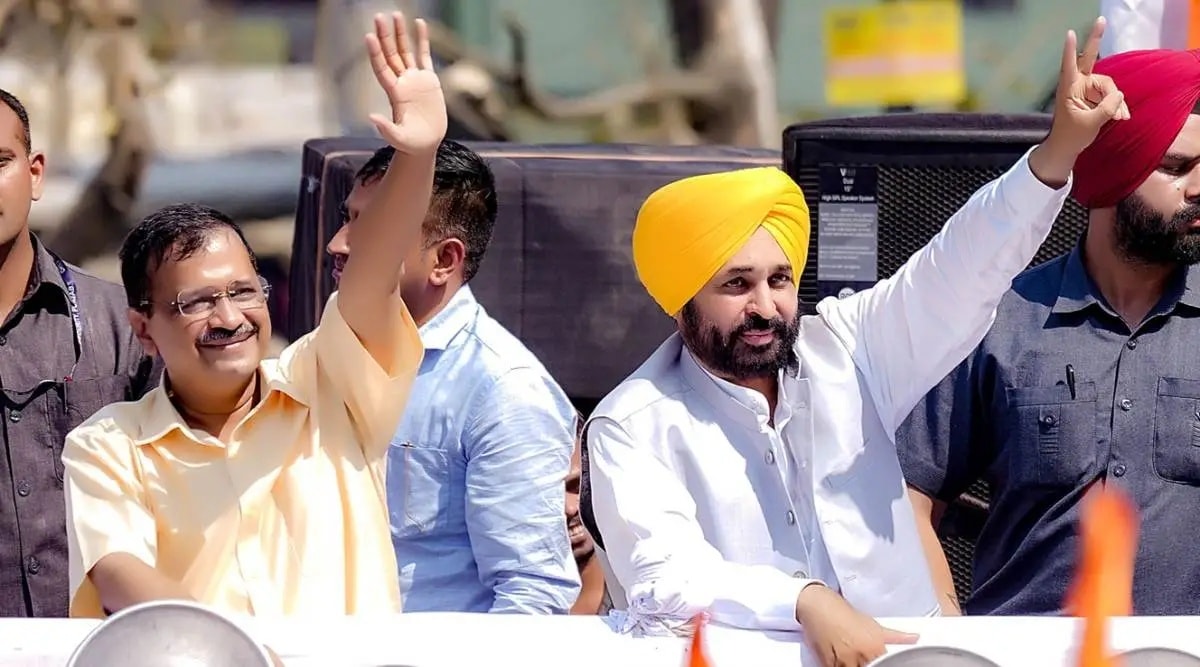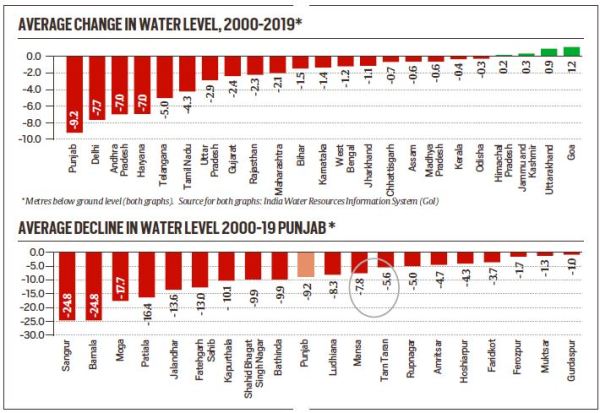 Delhi CM Arvind Kejriwal with Punjab CM Bhagwant Mann during a rally in Mandi district, Himachal Pradesh. (Express Photo)
Delhi CM Arvind Kejriwal with Punjab CM Bhagwant Mann during a rally in Mandi district, Himachal Pradesh. (Express Photo) The people of Punjab need to be complimented for giving a clear majority to the Aam Aadmi Party (AAP) in the recently-held Assembly elections. Chief Minister Bhagwant Singh Mann has a golden opportunity to put Punjab back on the track to higher sustainable growth, lower corruption and ensure freedom from the drug mafia. Only then can Punjab regain its happiness and prosperity.
Mann has already vowed to root out corruption from government offices, but so far, he has not revealed a blueprint for agriculture — a sector in which Punjab has been the front runner by ushering in the Green Revolution. But the state has been languishing of late. We attempt to sketch out the key issues in Punjab’s agriculture, the factors that have driven it to the current situation, and what could be the potential solutions that lead to sustainable prosperity.
The biggest problem facing Punjab’s agriculture is the fast-depleting and degrading quality of its groundwater resources. Over the last two decades (2000-2019), the groundwater table in Punjab has depleted by 9.2 meters, the highest amongst all major states in India (see graph). Groundwater stress is the highest in Punjab, with 78 per cent of the assessment units being categorised as “over-exploited” and the remaining falling under “critical” (4 per cent), “semi-critical” (6.7 per cent), and “safe” (11.3 per cent) categories. Moreover, within Punjab, groundwater has depleted by 24.8 metres in districts like Sangrur and Barnala (see graph). This is nothing short of plundering groundwater and robbing the rights of future generations.
In addition to this depletion, is the increasing degradation of water quality. Fluoride and nitrate contamination is directly linked to excessive use of fertilisers. Intensive use of urea and other nitrogen-bearing fertilisers leaves residual nitrates, which leach into the groundwater. Punjab also faces high uranium concentration in groundwater (CGWB, 2021), which is linked to anthropogenic factors leading to cancerous effects. There is the infamous “Cancer Express” that goes from Abohar to Bikaner. Nothing can be more serious than this. This trend must be arrested and reversed if we have any love and respect for our children and grandchildren. Interestingly, Mann comes from Sangrur, and reforms in this regard should start in his home district.
But how can we do that? Let us first understand the drivers behind this downward spiral. Punjab’s success in the Green Revolution led to an explosion of tubewells during the 1970s and ’80s. Then, in September 2001, the government announced free power for farmers. Paddy cultivation, which was already on the rise, became more entrenched with assured and open-ended procurement by the government at minimum support price (MSP). Massive subsidies for urea (almost 75 per cent of the cost) further lured the farmers to overuse it in a race to increase productivity. It is these subsidies on power, fertilisers, and open-ended procurement, at assured MSP, that made paddy more profitable compared to competing crops like maize and kharif pulses. Today, Punjab’s famous cuisine of “makki ki roti and sarson ka saag” and “dal makhni” are not supported by the state’s cropping pattern, which has become largely a paddy-wheat rotation. Punjab needs to get out of this for its prosperity and the sustainability of its agriculture.
It is clear that the solution lies in moving away from paddy to other remunerative crops that are less water-intensive. Today, paddy is grown on almost 3.1 million hectares, which needs to be cut to at least half. It cannot be done overnight. But Mann has five years to convert his dreams into reality. A five-year plan as a New Deal for farmers can be chalked out. Punjab has the highest irrigation cover (almost 99 per cent) of any state. It can move toward horticulture and other high-value crops with fertigation (drip irrigation with soluble fertilisers). This will immediately cut down water depletion and environmental degradation. But a horticulture revolution requires significant participation by the private sector in building efficient value chains from farmers to consumers.

Punjab can target airlifting horti-produce for countries in the Persian Gulf. Punjab has a huge agri-surplus and it must look to market its produce beyond the government agencies. The MSP business has outlived its utility and needs revamping. New start-ups in agri-marketing must be invited and given support to market “Grown in Punjab” produce in metro centres and large cities, as well as export them to Europe, Gulf, and Central Asian countries. Horticulture requires a cold storage chain, reefer vans, air-conditioned outlets, along with agro-processing. This is a great investment opportunity.
Punjab’s dairy is doing very well, with the highest yields. It needs to build on that with more value-added products such as Punjabi lassi, makhan and kulfi. Punjab can also emerge as a centre for buffalo meat export to Southeast Asian countries. The replacement of some paddy farms with dairy and fodder farms is water-efficient, too.
Basmati rice and wheat can continue with more value addition and branding. Pulses and oilseeds must be rewarded by extra incentives given directly to farmers to save groundwater, using less subsidised urea (as they are nitrogen-fixing), less power, and cutting down on methane and nitrous oxide emissions. Per hectare, direct benefit transfer for switching from paddy to pulses and oilseeds would be the way to go (not-MSP bound procurement by government agencies). This is like creating carbon credits and rewarding farmers for that through innovative policies and pilots. That would be the road to farmers’ prosperity with sustainability.
The challenge for Mann now is to device policies and scale-up pilots, especially in central Punjab’s hotspot districts, that can save groundwater and cut down emissions while making farmers more prosperous.
Gulati is Infosys Chair Professor, Sharma is Senior Visiting Fellow, and Thangaraj a Research Assistant at ICRIER
- The Indian Express website has been rated GREEN for its credibility and trustworthiness by Newsguard, a global service that rates news sources for their journalistic standards.

